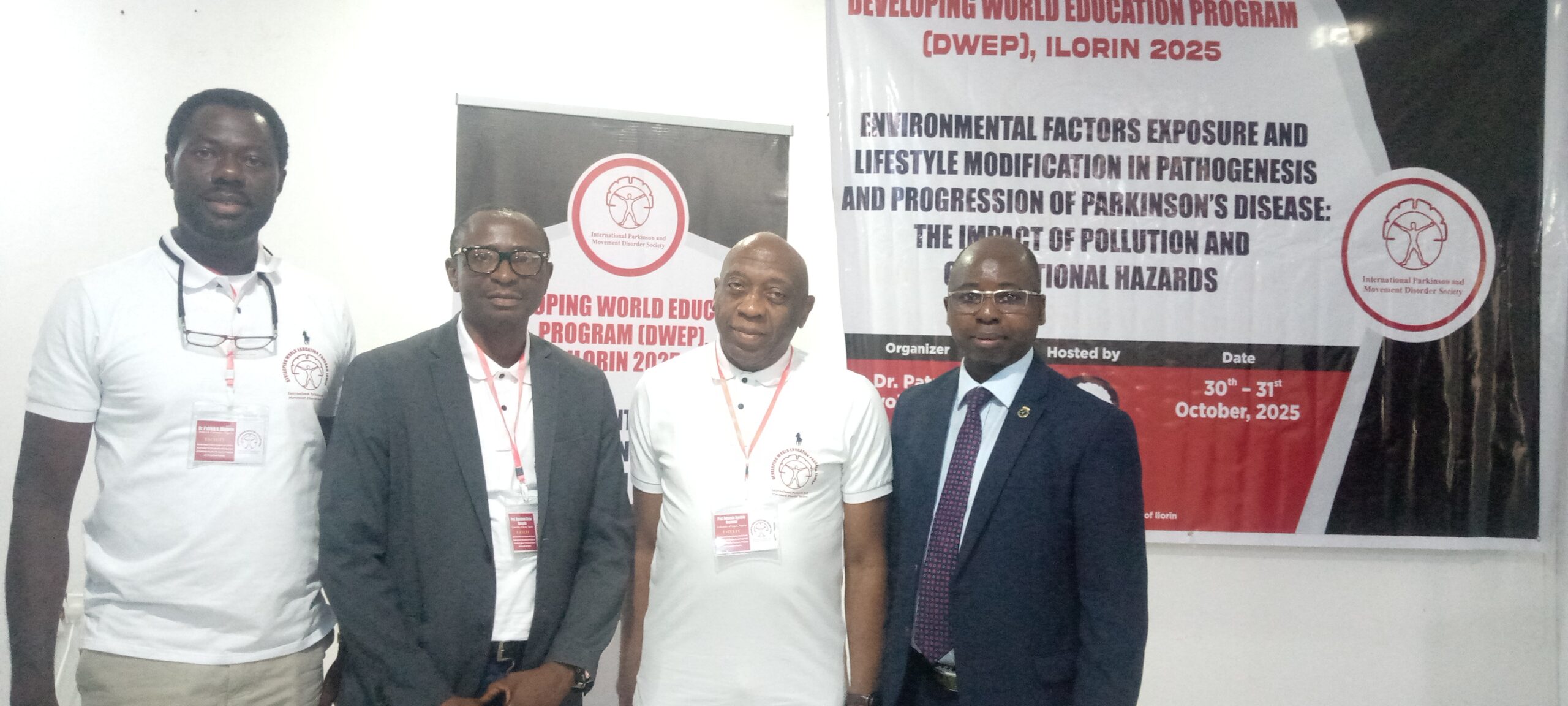By Sola Rotimi

From left: Dr. Abolarin; Profs. Owoyele, Oremosu, and Wahab.
They called on policymakers and advocacy groups to lead in sensitizing the public to the dangers associated with the use of pesticides and other chemical components in the agricultural sector and laboratories.
Their call came at a two-day summit of talks, activities and networking, organized by the Developing World Education Program (DWEP) under the International Parkinson’s and Movement Disorder Society, held at G-Pinnacle Suite, Ilorin, the Kwara State capital on Thursday, October 30, 2025.
The programme, with the theme “Environmental Factors Exposure and Lifestyle Modification in Pathogenesis and Progression of Parkinson’s Disease: The Impact of Pollution and Occupational Hazards,” highlighted the rising burden of neurodegenerative diseases, especially Parkinson’s, and the lack of awareness of risk factors, symptoms, and preventive and management measures.
They noted that Parkinson’s disease, a non-communicable condition that affects people aged sixty years and above, is becoming more prevalent among Nigerians due to exposure to metallic objects, pesticides, and other harmful chemicals.

A Principal Investigator at the Neuroscience and Inflammatory Lab of the University of Ilorin, Prof. Bamidele Owoyele, described environmental pollution as a major contributing factor, adding that it is not enough to use pesticides without considering their negative effects on the soil and water.
“The capacity training is a significant effort to train young people on the global trends around movement disorders and Parkinson’s disease. It is important because it focuses on the environmental factors that affect well-being and, specifically, movement disorders.
“It equips young scientists with cutting-edge techniques to excel not just locally, but internationally.
“A major environmental factor highlighted is pollution, specifically the use of pesticides and other chemicals. While these chemicals achieve the goal of destroying weeds and insects, they can get into the soil, water, and the air that we breathe. The accumulation of these chemicals over the years can begin to affect our cells, leading to the death of brain cells. This impacts our ability to perform normal functions effectively,” he said.
A Professor of Anatomy at the College of Medicine, University of Lagos, Ademola Oremosu, on his part, called for strict regulation of chemicals used by farmers due to their tendency to destroy the normal functions of the brain, potentially leading to Parkinson’s disease; the second most common neurodegenerative disease worldwide.
“We have what we call pollutants and environmental toxic agents, and these involve things that farmers use while trying to get rid of weeds and pests. Because these substances improve yield, a lot has not been examined regarding their effects on farmers who are exposed to them.
“So, one of the aims of this programme is to bring to the policymakers, the need for appropriate regulation. There is a particular one called Paraquat that is very toxic in terms of destroying the normal functions of the brain, which leads to Parkinson’s disease.”
He advised farmers and welders to wear nose masks and protect their eyes from exposure to toxic chemicals and metals.
A Brain Scientist from the Faculty of Veterinary Medicine, University of Ibadan, Prof. James Olopade, noted that Parkinson’s disease, though typically a disease of old age, affects more people in recent years, especially in oil-rich regions due to the high presence of vanadium, hence the need for more research into neuroprotective substances that can later become medications.

“We are trying to understand the causes of the increasing incidence of Parkinson’s disease among the elderly. Can we begin to discover new substances that can later become medications?
“That is why we are studying metals that are released into the air, especially from Nigerian crude oil. Vanadium is a major contaminant of Nigerian crude oil; we are studying it. We used African giant rats from the Niger Delta and compared them with those from Ibadan, and we discovered that the brains of the rats from the Niger Delta were deteriorating faster.
“We also measured the levels of metals in the brains, lungs, and kidneys. The concentration of vanadium was higher in those from the Niger Delta. We are now investigating plants that reduce the effects of vanadium,” he explained.
Prof. Kolawole Wahab, Consultant Neurologist at the University of Ilorin Teaching Hospital, stated that the use of bleaching creams and consumption of unregulated herbal mixtures can lead to movement disorders such as Parkinson’s disease.
“When we talk about disorders of movement, they could either be excessive or reduced. The prototype of reduced movement is Parkinson’s. If we recall Muhammad Ali, towards the end of his life, he developed shaking; that is one of the symptoms that can progress into Parkinson’s.
“It is not a disease that has only one cause. We talk about the interaction between genes and the environment. If someone carries the susceptibility gene and is exposed to environmental risk factors or lifestyle such as using bleaching creams containing mercury, or taking herbal products that are not clinically tested, the person is at higher risk of developing the disease,” he said.
Dr. Patrick Oluwole Abolarin, Lecturer and Neuroscientist at Babcock University, Ilishan-Remo Ogun State; Affiliate Researcher at the Neuroscience and Inflammation Lab, University of Ilorin; and a researcher on neuroinflammation, Parkinsonism, and antioxidant interventions, explained that the increasing prevalence of neurological diseases necessitated the programme, aligning with the focus of the International Parkinson’s and Movement Disorder Society.
“As researchers, we try to identify factors that contribute to the development of these diseases. We are often exposed to many environmental hazards; one of the major ones being pesticides.
“The unfortunate thing is that, in this part of the world, we are indiscriminately exposed to environmental toxins. While we aim at preventing neurological dysfunctions, especially motor disorders, we must also sensitize our society about the impact of these exposures,” he added.
The Neuro Scientists emphasized the need for young scientists to learn cutting-edge techniques for studying environmental factors and their impact on brain function. They also advised the general public to undergo regular health checks, engage in physical exercise, and avoid activities that may lead to head injuries.

The event also had in attendance, consultants, medical students, nurses, physiotherapists, others professions involved in the care of Parkinson’s disease, and other members of the public.


